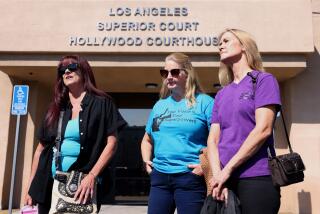Lawsuit says Cooley reneged on promise
- Share via
A former prostitute serving life in prison for murdering her abusive pimp sued Los Angeles County Dist. Atty. Steve Cooley on Thursday, contending that he reneged on a promise that would have shaved significant time off her sentence, attorneys said.
Advocates for battered women have criticized Cooley’s handling of Deborah Peagler’s case and others like it, saying he has consistently opposed the use of state law that allows defendants convicted of killing their batterers to win reduced sentences if they can show that the abuse, and its effects, led to the killing.
Cooley’s office initially supported Peagler’s bid for freedom, but later opposed it, the lawsuit says. Several nonprofit law centers and state Atty. Gen. Jerry Brown say Peagler deserves a new hearing on her claims.
“We’re not saying, ‘Acquit her; let her off scot-free,’ ” said Marci Fukuroda, a lawyer with the California Women’s Law Center in Los Angeles, which has filed court papers in support of Peagler’s petition. “We’re just saying her crime was not as serious as the one she was convicted of.”
Sandi Gibbons, a spokeswoman for Cooley, said prosecutors have reviewed Peagler’s conviction, as well as testimony she gave against a co-defendant more than 20 years ago, and concluded that “she took an active role in the killing, a more active role” than her lawyers now say.
“We think that the conviction is a sound conviction and she should not be released,” Gibbons said.
During his tenure, Cooley’s office has opposed the release of all eight women who have sought reduced sentences using the battered victim argument, according to Marisa Gonzalez, a lawyer with the California Habeas Project, a nonprofit group. The only woman from Los Angeles County who has successfully employed the argument to reduce her sentence was released from prison one month before Cooley took office in December 2000.
Peagler, 47, pleaded guilty to murder in 1983 and was sentenced to 25 years to life in prison, attorneys said. The plea deal allowed her to avoid the death penalty. Her lawyers say they can prove she was battered relentlessly; they contend that she is guilty of a lesser charge of manslaughter, which carries a lighter penalty.
At age 15, Peagler started working as a prostitute on the streets of South Los Angeles for Oliver Wilson, a pimp and drug dealer. He beat her with his fists and a bullwhip, and subjected her to severe psychological abuse, according to Peagler’s attorneys.
She acknowledged arranging Wilson’s murder with two men, although she was not present when he was killed. Prosecutors alleged that Peagler wanted Wilson’s life insurance, but her lawyers say her chief accuser has since recanted those accusations.
Today, Peagler is a born-again Christian who leads the church choir at the women’s prison in the San Joaquin valley town of Chowchilla, according to Joshua Safran, one of her lawyers.
At the time of her crime, there was no such thing as a battered women’s syndrome defense. The syndrome -- now called “intimate partner battering” -- is widely recognized as a behavioral condition, which leaves victims of abuse feeling powerless.
Since first recognizing the defense in 1992, the California Legislature has repeatedly expanded a defendant’s ability to cite domestic violence as a mitigating factor, or in arguing that a crime was committed in self-defense. Five years ago, the Legislature expanded the doctrine to cover serious crimes other than homicide, to make the law gender neutral, to allow women already convicted of crimes to challenge their convictions and to require parole officials to evaluate an inmate’s history as an abuse victim when considering an early release.
Gonzalez, the lawyer with the California Habeas Project, cited two surveys showing there are about 100 inmates statewide who might benefit from the expanded doctrine. She said she is aware of 22 cases statewide in which alleged abuse victims have challenged their sentences. Nine have been granted -- all but one from outside Los Angeles County, Gonzalez said. In most of those cases, local prosecutors have not objected, she said.
Gonzalez said she does not believe Cooley is carefully reviewing the merits of cases brought by convicted abuse victims.
“We’ve seen other women in other counties being released, and in a lot of those cases, the district attorney has really taken a look at the facts and concluded they wouldn’t have charged that way today,” she said.
According to Thursday’s lawsuit, Cooley told Peagler’s attorneys in 2005 that he was sympathetic to her situation and agreed that her sentence should be reduced. Cooley’s office wrote Peagler’s attorneys offering to let her plead guilty to manslaughter, setting up her imminent release.
“I sat down with Cooley; I shook his hand. He looked me in the eye,” Safran said. “I believe that he knew it was the right thing to do and he wanted to release her.”
He said he believes that Cooley, whose office subsequently withdrew the offer, was influenced by staff prosecutors who do not believe that domestic violence is a viable defense or mitigating factor.
Peagler’s lawyers have asked a judge to order Cooley to honor the promise he allegedly made.
“The need for public confidence in the integrity of the prosecutor’s office requires the prosecution to abide by its promises,” the lawsuit says.
Gibbons said Cooley’s prosecutors “go by the evidence in the case, as it was presented in court.”
More to Read
Sign up for Essential California
The most important California stories and recommendations in your inbox every morning.
You may occasionally receive promotional content from the Los Angeles Times.










